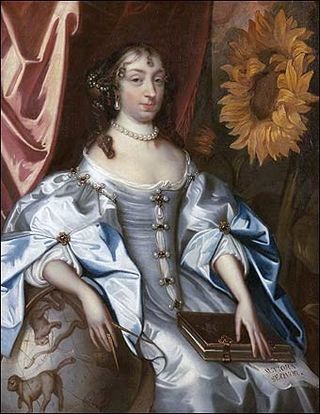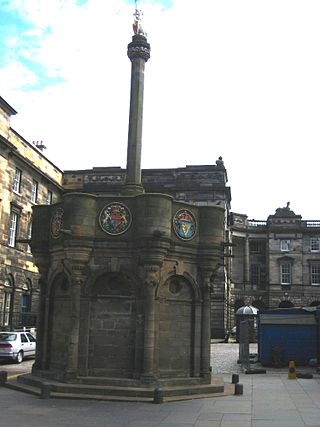Related Research Articles
Miles Sindercombe was the leader of a group that tried to assassinate Lord Protector Oliver Cromwell during the period of the Protectorate in 1657.

Sir Bulstrode Whitelocke was an English lawyer, writer, parliamentarian and Lord Keeper of the Great Seal of England.

Northborough is a small village and civil parish in the Peterborough district, in the ceremonial county of Cambridgeshire, England. It has a pub, a shop, a school and a small castle. Northborough is around eight miles north of the city of Peterborough and one mile south of village of Deeping Gate and the Lincolnshire border.

John Jones Maesygarnedd was a Welsh military leader and politician, known as one of the regicides of King Charles I following the English Civil War. A brother-in-law of Oliver Cromwell, Jones was a Parliamentarian and an avid republican at a time when most of Wales was Royalist, and became one of 57 commissioners that signed the death warrant authorising the execution of Charles I following his trial. After the Restoration of the monarchy, Jones was one of few excluded from the general amnesty in the Indemnity and Oblivion Act, and was tried, found guilty, then hanged, drawn and quartered at Charing Cross.
William Boteler was a member of the Parliament of England. After the English Civil War, he was appointed Major-General for Bedfordshire, Huntingdonshire, Northamptonshire and Rutland during the Rule of the Major-Generals.

Philip Sidney, 3rd Earl of Leicester was an English politician who sat in the House of Commons at various times between 1640 and 1659 and became Earl of Leicester in 1677. He supported the Parliamentarian cause in the Wars of the Three Kingdoms, when he was known as Viscount Lisle, a subsidiary title of the Earls of Leicester.

Sir Gilbert Pickering, 1st Baronet, 10 March 1611 to 17 October 1668, was a member of the landed gentry from Northamptonshire, and a religious Independent who supported Parliament in the Wars of the Three Kingdoms. An MP for Northamptonshire for most of the period from 1640 to 1660, during the 1649 to 1660 Interregnum he also served as Lord Chamberlain, sat on the English Council of State, and was appointed to Cromwell's Upper House in 1658.

James Compton, 3rd Earl of Northampton FRS, was an English peer, politician and author, who fought for the Royalists during the First English Civil War.
Anthony Hungerford (1614/15?–1657) was a Colonel in the English Parliamentary army who fought in Ireland during the War of the Three Kingdoms.
Anthony Hungerford of Black Bourton (1607/08–1657), was an English Member of Parliament who supported the Royalist cause during the English Civil War.

Thomas Bampfield or Bampfylde was an English lawyer, and Member of Parliament for Exeter between 1654 and 1660. For a short period in 1659, he was Speaker of the House of Commons in the Third Protectorate Parliament.

Durham College, or New College, Durham, was a university institution set up by Oliver Cromwell, to provide an alternative to the older University of Oxford and University of Cambridge. It also had the aim of bringing university education to Northern England.
John Reynolds (1625–1657) was a soldier in the English Civil War and during the Commonwealth. Reynolds may have been a member of the Middle Temple. He joined the parliamentary army, and in 1648 he commanded a regiment of horse. He took part in the Cromwellian conquest of Ireland. He was a member of the Westminster-based Protectorate Parliament for Galway and Mayo in 1654 and Waterford and Tipperary in 1656. He was knighted in 1655. In 1657 he commanded the English force which cooperated with the French in Flanders in the Anglo-Spanish War and was lost at sea when returning to England.
John Claypole was an officer in the Parliamentary army in 1645 during the English Civil War. He was created Lord Claypole by Oliver Cromwell, but this title naturally came to an end with the Restoration of 1660.

Elizabeth Claypole was the second daughter of Oliver Cromwell, Lord Protector of the Commonwealth of England, Scotland and Ireland, and his wife, Elizabeth Cromwell, and reportedly interceded with her father for royalist prisoners. After Cromwell created a peerage for her husband, John Claypole, she was known as Lady Claypole. She was buried in Westminster Abbey.

Colonel John Pickering, baptised 3 December 1615, died 24 November 1645, was a member of the landed gentry from Northamptonshire who served with the Parliamentarian army in the First English Civil War. Like his elder brother Sir Gilbert Pickering, a close ally of Oliver Cromwell, he was a religious Independent, known for his devout faith and radical views. Appointed colonel of an infantry regiment in the New Model Army, he died of fever at Ottery St Mary on 24 November 1645.
Richard Wingfield, 1st Viscount Powerscourt, PC was an English-born army officer and military administrator during the reigns of Elizabeth I and James I. He is notable for his defeat of Sir Cahir O'Doherty's forces at the 1608 Battle of Kilmacrennan during O'Doherty's Rebellion in Ireland.

Cromwell's Act of Grace, or more formally the Act of Pardon and Grace to the People of Scotland, was an Act of the Parliament of England that declared that the people of Scotland were pardoned for any crimes they might have committed during the Wars of the Three Kingdoms. It was proclaimed at the Mercat Cross in Edinburgh on 5 May 1654. General George Monck, the English military governor of Scotland, was present in Edinburgh, having arrived the day before for two proclamations also delivered at the Mercat Cross, the first declaring Oliver Cromwell to be the protector of England, Ireland and Scotland, and that Scotland was united with the Commonwealth of England.
John Ashe (1597–1658) was an English clothier and politician who sat in the House of Commons at various times between 1640 and 1656.
During the Protectorate period (1653–1659) of the Commonwealth of England, the Lord Protector reserved the power previously held by the monarch to confer knighthoods, baronetcies and peerages.
References
- ↑ Lolham Hall, Maxey, BritishListedBuildings.co.uk
- ↑ "Chapter 15: Upton Church" (PDF), Five Parishes, Their People and Places: A History of the Villages of Castor, Ailsworth, Marholm with Milton, Upton and Sutton, The CAMUS Project, 2004, p. 153, ISBN 978-0954788117
- 1 2 3 4 Mark Noble, Memoirs of several persons and families who, by females, are allied to, or descended from the Protectorate-House of Cromwell, chiefly collected from original papers and records. To which is added a catalogue of such persons who were raised to honors or great employments by the Cromwells, with the lives of many of them. Volume II, Birmingham, Printed by Pearson and Rollanson, 1784. "Chapter 24 John Cleypole, Esq". pp. 249–362
- ↑ Willis, Browne (1750). Notitia Parliamentaria, Part II: A Series or Lists of the Representatives in the several Parliaments held from the Reformation 1541, to the Restoration 1660 ... London. pp. 229-239.
- ↑ Firth, Charles Harding (1887). . In Stephen, Leslie (ed.). Dictionary of National Biography . Vol. 11. London: Smith, Elder & Co. p. 12.
- ↑ Firth, C. H.; Roots, Ivan (reviewer). "John Clayople". Oxford Dictionary of National Biography (online ed.). Oxford University Press. doi:10.1093/ref:odnb/5567.(Subscription or UK public library membership required.)
- 1 2 Zahedieh, Nuala. "James Clayople". Oxford Dictionary of National Biography (online ed.). Oxford University Press. doi:10.1093/ref:odnb/50425.(Subscription or UK public library membership required.)